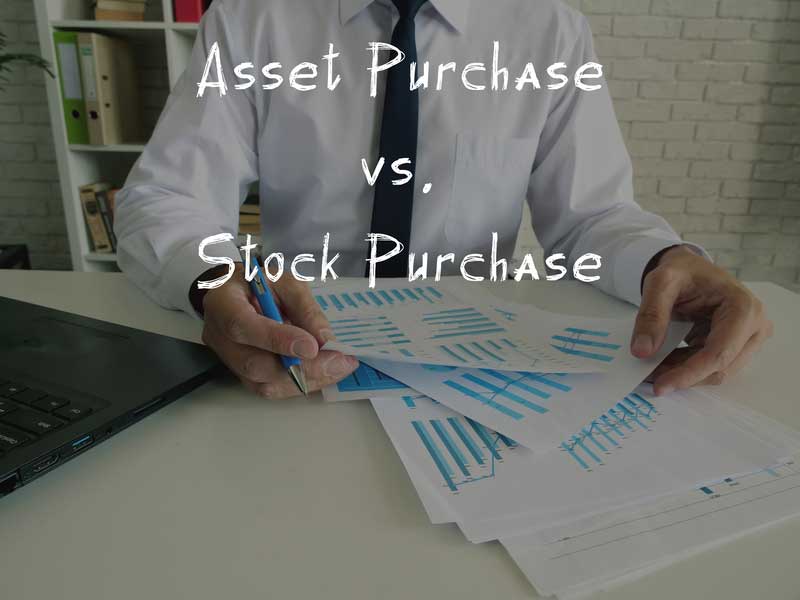
Stock Sale vs Asset Purchase
There are two types of transaction structures for the sale of a business if it is a corporation, an Asset Purchase or a Stock Sale. Below we explain the two transaction types and at the bottom of the page, we have provided a table summarizing the advantages and disadvantages of Stock Sales vs Asset Sales.
What is an Asset Sale of a Business?
Many confuse the legal term Asset Sale (Asset Purchase Agreement) with the liquidation of the company’s assets. While a “liquidation of assets” is also an Asset Sale, the term Asset Sale refers to the sale of all of the company’s assets, tangible and intangible, including Goodwill, trade name, customer lists, and all of its tangible assets such as equipment, tooling, fixtures, etc. The Asset Sale is the most common form of transaction in sale of a small to midsize business because it limits successor liability for the buyer.
At the close of escrow, all of the assets of the company being sold are transferred to the buyer or their corporation and the cash for the acquisition is transferred to the seller’s corporation. The seller’s corporate entity survives and the buyer’s new corporation now owns the assets. Future or unknown past liabilities as a result of actions or events under the seller’s ownership (prior to the close of escrow) would be the responsibility of the seller’s corporation and the buyer has limited successor liability. Note that this is not a perfect shield for the buyer and in some instances, there can still be successor liability, but it is limited.
You should discuss the transaction structure with your CPA and attorney there are tax consequences and legal considerations.
What is a Stock Sale of a Business?
A stock sale is the sale of the corporate shares of the business. In the sale of small to midsize Orange County businesses, it is normally 100% of the shares in the company. If the transaction is utilizing SBA financing, many SBA lender requires 100% of the shares of the company are purchased by the buyer and the seller retains 0% stock after closing. New SBA rules in 2023 now allow the Seller to retain stock in the company after a stock sale. Implementation of this rule varies with SBA lenders and depends on each banks underwriting and lending guidelines.
Stock sales have several advantages for the seller and for the buyer as well in specific circumstances. For the seller, a stock sale offers lower taxes in that much of the transaction will be taxed at capital gains, the lowest tax rate (check with your CPA for details as this depends on many factors). For the buyer, a stock sale preserves contracts with customers and contractor’s licenses, etc because the corporate entity does not change. This is especially important with government contracts and long-term contracts.
For buyers, stock sales have disadvantages. In a stock sale, the corporate entity survives and the buyer assumes ownership of the corporation. With that also comes successor liability such as the risk of litigation, IRS audits, workman’s comp claims, employment claims, etc from prior to their ownership. The CABB Purchase Agreement deals with this in the seller’s Representations and Warranties and has a seller indemnification, but even with this, there is the risk that the seller may not pay for claims that arise later. We often resolve this with a Seller Note with the Right of Offset should the buyer incur actual claims and losses as a result of the seller’s ownership or actions. In stock sales, the buyer’s attorney will likely add additional representations & warranties and indemnification from the seller.
Stock Sales are necessary for specific circumstances such as when the target company has special licensing and/or contracts that are difficult to transfer. Pacific Business Sales has a great deal of experience with these transactions and a team of attorneys experienced in small-midisize business acquisitions we can refer our clients to. We always advise our clients to consult with their financial advisor and attorney in these transactions.
Advantages & Disadvantages of Stock Sales vs Asset Purchase of a Business
Stock Sale
| Advantages | Disadvantages |
|---|---|
| Offers the most favorable tax rate for the seller; taxed at capital gains rate if the shares qualify. | Risk of future liabilities from actions under the the seller’s management such as tax liabilities, workman’s comp claims, employee claims, future litigation, OSHA, etc. (note researching this is part of Buyer Due Diligence and mitigating these risks are part of the transaction structure and negotiation) Requires Buyer and Seller to engage an attorney to advise them on the transaction and review the Stock Puchase Agreement. |
| Ongoing contracts are preserved and do not require assignment to a new entity. This is especially helpful with government contracts and contracts that would require a new contract to be written. Preserving existing contracts is important with companies that have government contracts or ongoing contracts in the corporate entity’s name. Some examples are Construction companies, military-aerospace manufacturers, healthcare care such as Home Healthcare and medical providers, and manufacturers with government contracts. | Requires a more thorough and comprehensive Due Diligence by the buyer. |
| Contractor’s License and other licenses such as Home Healthcare state licenses stay with the corporation. This can be critical for businesses where the existing license must be preserved. For example; Medical Home Healthcare licenses take a very long time to obtain and the process is extremely complicated. Acquiring a licensed company is highly desirable. Likewise, with licensed contractors, preserving the existing licensing simplifies the acquisition for the buyer. (note that the corporation still requires a qualifying person, an RMO or RME in the case of contractors licenses or Director of Nursing for Medical Home Healthcare, etc) | Requires buyer and seller to establish a value for Assets and Liabilities at closing and then final adjustment for variances at closing. (this is addressed in the Stock Purchase Offer) |
| Patents, copyrights, trademarks, etc stay with the corporation (if in the corporation’s name). | Requires an attorney to handle the stock transfer and associated paperwork. |
| Buyer can step up depreciation similar to that of an Asset Sale through an IRS 338 (h) election or an F Re Org. (this requires a CPA experienced with this transaction structure. We work with several CPAs familiar with this). | The buyer assumes the assets at the current depreciated value which can result in a large loss in depreciation. However, with election of IRS 338 (h) or an F Re Org the asset value can be stepped up. Note that both IRS 338(h) and an F Re Org have tax benefits for the Buyer but have tax consequences for the Seller. Both Buy and Seller should discuss this with their CPA and attorney. |
Asset Purchase
| Advantages | Disadvantages |
|---|---|
| Buyer can specify which liabilities are assumed. | Buyer may have sales tax on equipment and other tangible assets purchased. |
| Buyer can step up depreciation value of assets to full market value. | Requires assignment of contracts to new corporate entity for ongoing or open contracts. Many licenses such as Contractor Licenses cannot by assigned or transferred. The Buyer’s new corporate entity will have to obtain new contractor licenses. |
| Goodwill can be amortized over 15 years, equipment and other tangible assets are depreciated over IRS schedules. | Seller taxes are generally substantially higher, especially if the company is a C Corp. Note that we work with a number of Tax Strategy CPAs that can dramatically reduce the taxes of an Asset Sale. |
| Buyer’s exposure to seller’s liabilities is limited and generally not responsible for liabilities of the seller’s corporation (e.g. tax liabilities, workman’s comp, litigation from prior ownership, etc). | New employment agreements with employees need to be established. Technically all employees cease working for the seller’s corporation at the closing and start working for the buyer’s corporation as new employees. This requires new W4s, I9s, etc for the new employer. The seller must also close out any vacation-sick time at the closing. |
| Seller pays off all outstanding liabilities at closing, the buyer acquires the business with no outstanding liabilities. (unless specifically assumed). Escrow runs lien checks and requires all liens to be removed prior to closing. Escrow also obtains tax releases from the CA FTB, CDTFA, and CA EDD prior to closing. Tax releases are a benefit to both Buyer and Seller. | Seller must pay off all outstanding liabilities at closing (usually done through escrow at closing). |
| A/R (accounts receivable) can be purchased from the seller and in most cases added to SBA financing. | Requires Landlord consent for transfer or lease or new lease. Note that some landlords may assign the lease, which may leave the Seller on the lease as a guarantor. |

Seller’s Perspective of a Stock Sale
In general, a stock sale is a significant plus for the seller. It offers substantial tax savings and in some cases a quicker closing process. Consult your CPA and tax advisor about the prospective taxes with a stock sale as this depends on a number of factors with respect to the type of entity and how long the shares have been owned.
Buyer’s Perspective of a Stock Sale
While a stock sale is generally all good news for the seller, there are several concerns for a buyer. Perhaps the most worrying is the risk of future liabilities of the corporation. In a stock sale the buyer is buying the corporate entity and unlike the asset sale where these liabilities would stay with the old entity, in a stock sale these liabilities stay with the existing corporation. These liabilities could include workman’s comp claims, warranty claims, product defect, and any litigation where the company is named.

With the risk of litigation and other challenges below why would a buyer want to do a stock sale? Simply put, in some instances a stock sale is the only feasible way for the transaction to work. For example, if the company is a contractor the contractor’s license is likely in the corporation’s name and in the event of an asset sale the buyer would have to obtain an entirely new contractor’s license and number. This would require notifying all of the customers and changing the contractor’s license on any open or ongoing contracts.
Likewise, if the company has ongoing contracts in the corporate entity’s name, in event of an asset sale each customer would have to be notified and agree to an assignment of contract to the new corporate entity.
Patents and trademarks are yet another reason to consider a stock sale. While these can be transferred to a new entity, it can be complicated.
Thus, contracts, agreements, and intellectual property ownership often make a stock sale the better choice for both buyer and seller.
Another downside of stock sales for buyers is the loss of depreciation of the company’s assets. In an assets sale the buyer and step up the depreciation value of the assets to full market value giving the buyer a significant tax benefit. In a stock sale the asset depreciation value remains the same and if the assets are largely already depreciated there is little if any tax benefit.
However, there is a way to step of the value of the assets to full market value in a stock sale. If buyer and seller agree to elect IRS 338 (h) the buyer can increase the asset values to the same values and treatment as an asset sale. The 338 (h) is a complicated tax strategy and you should consult an experienced CPA to implement this for you. IRS 338 (h) offers buyers a way to do a stock sale with the same depreciation as an asset sale and thus a significant tax advantage to the buyer.
Read More about IRS 338 (h) here: Forbes A Buyer’s Best Friend – Understanding The Section 338(h)(10) Election
Instances where a Stock Sale simplifies the transition
Some companies such as contractors have a license in the corporation’s name. If the company is acquired via an Asset Sale the contractor’s license stays with the seller’s corporation and the buyer must obtain a new contractor’s license. This can complicate the transition in that any open contracts must be assigned (client notified and contract changed) to the new contractor’s license, even though the buyer has acquired the trade name (aka DBA or FBN).
If the corporation is acquired via a Stock Sale there is no change in the contractor’s license and open contracts do not need to be assigned to the new contractor’s license.
This is also the case when a company has ongoing contracts in the corporation’s name. Any open contracts would need to be assigned to the new corporation in order to be valid.